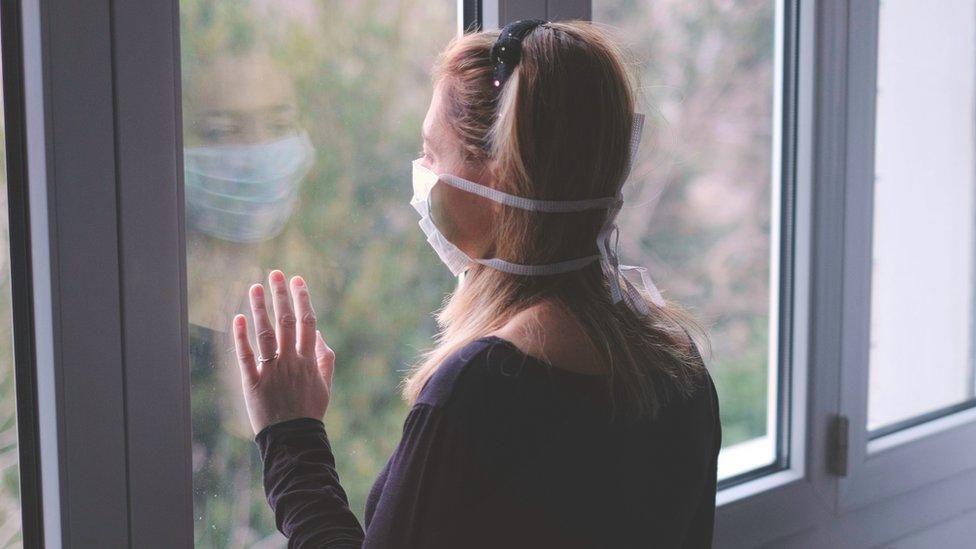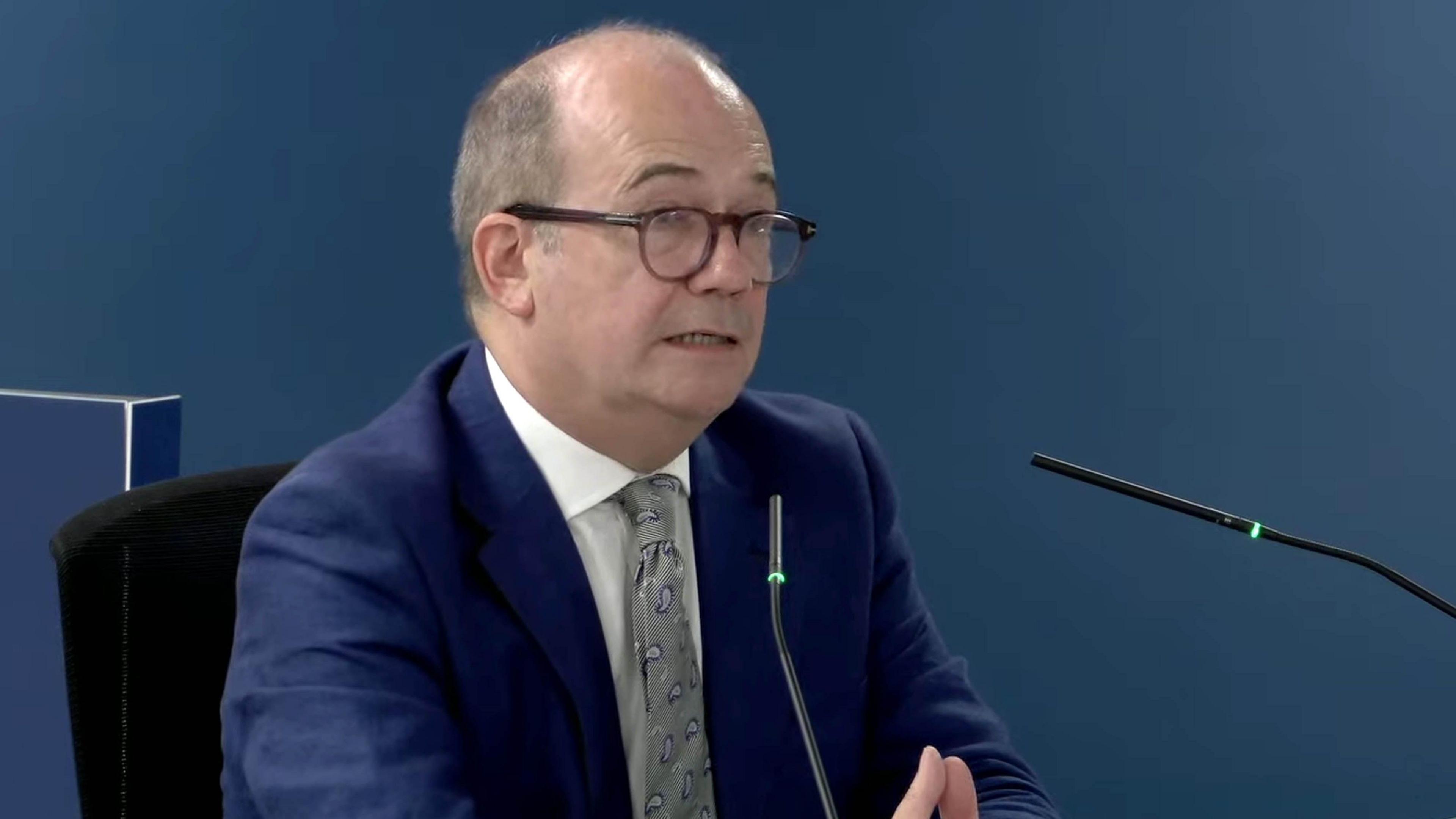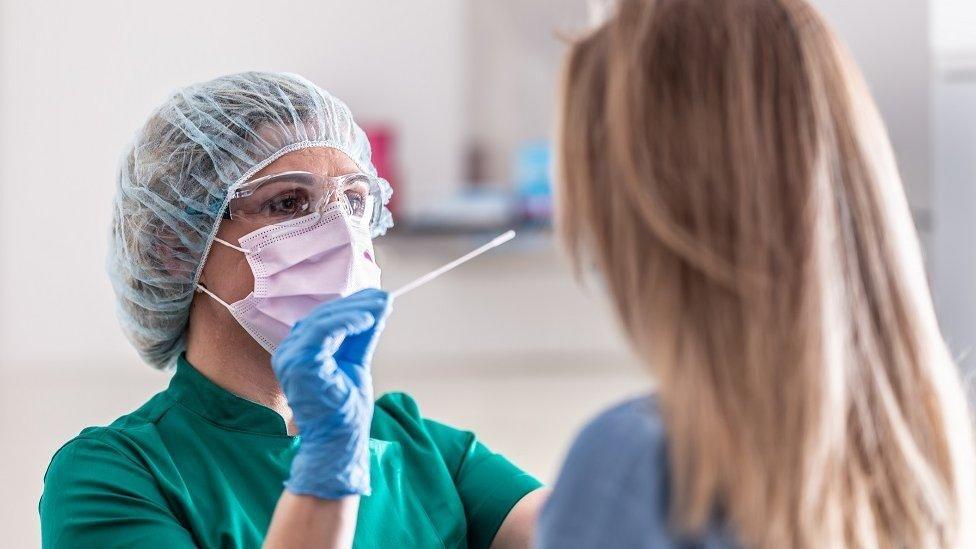Keep shielding in reserve in future pandemic, CMO says

Formal advice telling people to take extra care, or shield, was aimed at stopping them becoming seriously ill
- Published
Shielding should be seen as a reserve public health measure in any future pandemic, Northern Ireland's chief medical officer (CMO) has said.
Prof Sir Michael McBride was giving evidence at the UK Covid-19 public inquiry on Tuesday.
He said the decision to ask those deemed most vulnerable to stay at home during the pandemic had been a very difficult one to make.
In any future pandemic, he added, a focus was needed on suppressing virus transmission with shielding kept "in reserve".

Prof Sir Michael McBride said asking people to stay at home had been a difficult decision
At the start of the Covid-19 outbreak in March 2020 scores of people considered to be clinically extremely vulnerable were, in order to protect themselves from the virus, advised to remain at home.
The decision to ask people to stay at home and shield from the virus, he said, was taken on balance, in the context of a new virus that was causing serious illness in some, no immunity and no treatment or vaccine.
“I think that given the profound consequences that shielding had, I think the primary approach to future pandemics should be suppressing the transmission of the virus and only keeping shielding in reserve if indeed it is necessary and, if it is necessary, then, for as short a time as is possible," Sir Michael said.
He said a report he commissioned in May 2020 showed those affected were left afraid and anxious by the experience.
“I recall saying during some of the media briefing at the time, this was about protecting the vulnerable from the virus, but it was not about removing the vulnerable from society,” Sir Michael said.
“While we endeavoured to ensure that we communicated the advice clearly, as honestly as we could, based on the information that we had, and tried to keep that updated in a variety of ways, I think the net result of the advice on shielding was we engendered a significant degree of fear in those who were shielding, fear and anxiety.”

Prof McBride told the inquiry there had not been adequate support for health service staff
Public health messaging for those people who were shielding in the earliest stage of the Covid-19 pandemic could have been more nuanced, the chief medial officer said.
There had been “some issues in relation to communications” resulting from the “pace of events” specifically in relation to “the population of people who had been shielding,” Sir Michael said.
“It became very difficult later on, when the harm-and-benefit analysis changed, to provide them with assurance, to the population of people who had been shielding who were clinically extremely vulnerable, and, looking back, I think some of the initial messaging around that could have been more nuanced.”
The chief medical officer was asked if, with hindsight, he felt he had got all the decisions right.
That, he said, would be for the inquiry to determine.
The inquiry heard from Sir Michael's statement that "ethnic minorities form a much smaller proportion of the population than in many other regions of the UK and ethnicity is not well coded in Northern Ireland health care records.
"As a consequence, analysis regarding ethnic minorities was not available due to the poor coding of ethnicity in health care records and it was not possible to look at trends in those from different ethnic backgrounds nor to analyse impacts,"
"Within the health care systems one can record ethnicity but there is not uniform recording of ethnicity and that is something that clearly does need to be improved."
It was put to Sir Michael that in his response to the pandemic he would have been aware of the disproportionate impact of Covid-19 on black and minority ethnic workers in particular and that he would have wanted to look at the data to see how this impact was playing out in Northern Ireland.
Sir Michael told the inquiry that he would have wished to do that but because of the lack of data it was not possible.
The chairwoman of the inquiry, Baroness Hallett questioned Sir Michael about the fact that in September 2024 there were still no changes to ensure that Northern Ireland could record ethnicity where there was a disproportionate impact
The chairwoman asked her counsel to make sure that when they hear from Robin Swann that those who were advising him, and his department were aware about her concern about this issue.
'Heavy toll'
He also told the inquiry Northern Ireland did not have the health service it needed at the start of the pandemic.
It was a health service, he said, “which was well overdue for structural reform".
He also said he did not believe that health and social care was equipped to meet the needs of the population at the start of 2020.
He said the pandemic had taken “a heavy toll” on health service staff in Northern Ireland.
“I’m not certain there was sufficient support available to healthcare workers working anywhere during the pandemic," he said.
“I only wish that we could have done more. Looking back on it, these were my friends and my colleagues, my daughter was working in intensive care during the pandemic.
“Whether you were working in intensive care, working in a ward or working in a care home, these were harrowing experiences.”